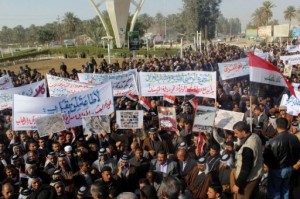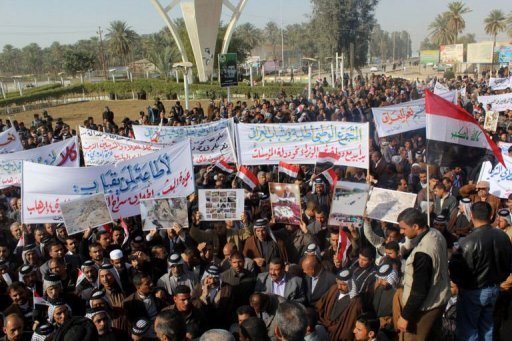
Baghdad (AFP) – Thousands took to the streets in predominantly Shi’a southern Iraq on Tuesday in a show of support for the Shi’a premier after more than two weeks of protests in the mainly Sunni Arab north and west.
The loyalist rallies are the latest twist in a long-running standoff within Iraq’s unity government between Prime Minister Nuri al-Maliki and his mainly Sunni Arab critics who accuse him of abusing counter-terror legislation to persecute the minority community.
In a show of support for anti-government demonstrations, meanwhile, several Sunni and Kurdish ministers boycotted Tuesday’s weekly cabinet meeting, a government source told AFP.
Pro-government demonstrations were held in the port city of Basra, and the southern cities of Kut, Diwaniyah, Karbala and Samawa, AFP journalists said, dismissing calls for reform of anti-terror laws and condemning the alleged involvement of other Middle Eastern countries in the anti-government rallies.
They ranged in numbers from several hundred in Kut to thousands in Basra.
Demonstrators carried photographs of relatives they said were killed in militant attacks, as well as Iraqi flags and banners painted with slogans including, “with our blood and souls, we will protect Iraq,” and “no, no for sectarianism; yes, yes for national unity”.
Some placards backed Maliki, while others asked: “Is it just to release those responsible for killing?”, a reference to calls in anti-government protests for the release of prisoners allegedly being wrongfully held.
They came after weeks of protests in Sunni-majority provinces triggered by the arrest of at least nine guards of Finance Minister Rafa al-Essawi, a top member of the secular Sunni-backed party that is part of Maliki’s unity government but is frequently publicly critical of the premier.
Among those rallies have been an ongoing sit-in in western Anbar province that has blocked off a key highway linking Iraq to Syria and Jordan since 23 December.
The anti-government rallies continued on Tuesday in Anbar, as well as several cities in Salaheddin province, north of Baghdad.
Although the demonstrations in southern Iraq have been predominantly Shi’a and the protests in northern and western Iraq mostly Sunni, powerful Shi’a cleric Moqtada al-Sadr has publicly backed the anti-government rallies.
The rival demonstrations come barely three months before provincial council elections, the country’s first vote since parliamentary polls in March 2010.

